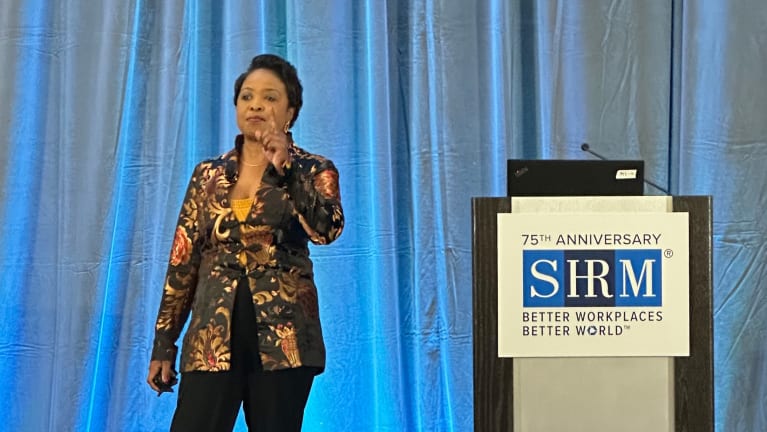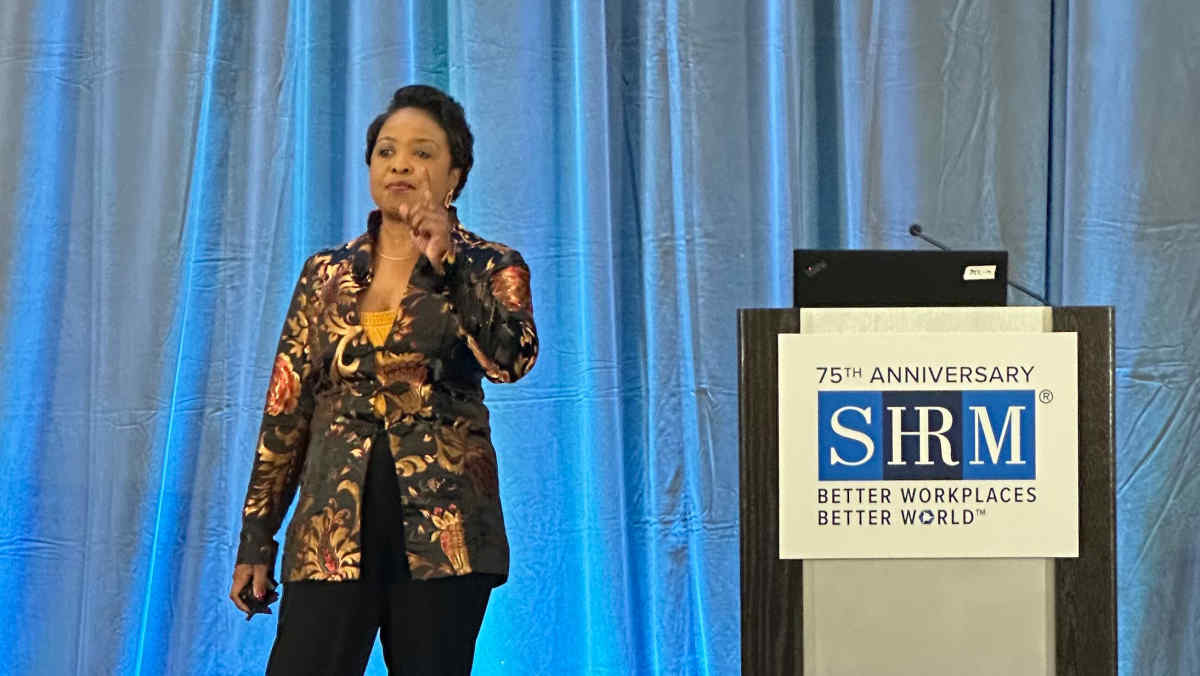

?Longtime HR professional Shirley Davis, SHRM-SCP, was meeting with a team member recently and knew something was off when she saw him. He appeared distraught, and his face was flushed. She could tell he had been crying, she told attendees at a June 13 presentation at the SHRM Conference & Expo 2023 in Las Vegas.
“Help me understand what’s going on,” a concerned Davis recalled saying to the employee. Sick with hurt, he broke down in tears, barely able to get the words out—his significant other was cheating on him.
This was not the time to talk business and ignore his pain, Davis decided. They rescheduled the meeting, with Davis suggesting he find a quiet place to decompress, take a walk or clock out for the rest of the day.
It was an example of displaying empathy—one of the soft skills she discussed during her concurrent session “The Hardest ‘Soft Skills’ Every Leader Must Demonstrate.”
Davis is president and CEO of SDS Global Enterprises Inc., in West Chapel, Fla. Her 30 years in HR includes working at several Fortune 100 companies and serving nearly eight years at SHRM as vice president of global diversity and inclusion and workplace strategies.
She has a doctorate in business management and organization management, a master’s degree in HR management, and is a certified leadership coach. She also authored several books, including The Seat: How to Get Invited to the Table When You are Over-Performing and Undervalued (Success Doctor, May 2021).
Davis exhorted leaders to do a better job of understanding the different needs and expectations of their employees.
The new generation of talent, she said, “want to work at an organization where [they] will be seen, will be heard, will be valued, will be respected.” Young workers also value leaders who display soft skills, such as empathy, she added.
Leaders have a lot on their minds, Davis acknowledged, ticking off a list of concerns that include but are not limited to a focus on employee mental health, well-being and psychological safety; rising inflation and the threat of a recession; the labor shortage; the need to increase the talent pipeline of women and individuals from underrepresented groups; and keeping pace with technological advances.
Five Soft Skills for Leaders
However, Davis drilled down on the importance of soft skills, noting they “are really the hardest ones for leaders to demonstrate” but resonate with their employees.
1. Adaptability.
“Most people don’t like change,” Davis said. She noted there are three kinds of people: The ones who make change happen, the ones who watch change happen and the ones who wonder ‘What happened?’
“We have to be those that make change happen and do it early on,” she said.
2. Cultural competence.
“This is that ability to interact effectively with people who don’t see the world the way you see it, who were not raised with the same messages you were taught, who have a very different lens and schema in which they see the world.
“Building cultural competence is a journey,” she said and pointed to former President Bill Clinton, keynote speaker on June 12, who talked about the need to be accepting of differences.
3. Emotional intelligence.
“This is our ability to be able to recognize and regulate and convey our emotions,” Davis said. Do you easily lose your temper? Learn how to regulate that, she noted as one example of emotional intelligence (EI).
Davis emphasized the importance of knowing your “why” in life. That self-awareness “drives everything you do.” Without it, “you make decisions kind of willy-nilly and not tied to anything.”
EI also involves developing a kind of emotional “muscle.” In one hypothetical scenario, Davis asked attendees to consider how they would respond to a newly hired employee having trouble learning a key aspect of their job. Ideally, the response would include asking what you can do to help and support them, finding out the learning method that best works for them, and helping get them up to speed.
4. Empathy.
This involves the ability to approach others with kindness, respect and dignity, and without judgment. Empathy fosters positive relationships.
“If [someone] is upset in your office, how comfortable are they at coming to you to share why? How do you respond? How consistent are you at giving praise and recognition without reservation?” Davis asked.
5. Trust building.
Employees want to feel safe, Davis said, “to take risks, to speak up, to make mistakes.” She cited a Harvard Business Reviewstudy that compared high-trust and low-trust companies. Employees at high-trust companies reported:
- 106 percent more energy.
- 76 percent more engagement.
- 74 percent less stress.
- 50 percent higher productivity.
- 40 percent less burnout.
Building trust, she said, involves displaying civility; treating people with respect; communicating clearly, openly and honestly; leading by example; honoring your commitments; owning up to your mistakes; and avoiding blaming and shaming.
“The hardest soft skills,” she said, “really do make a difference.”
